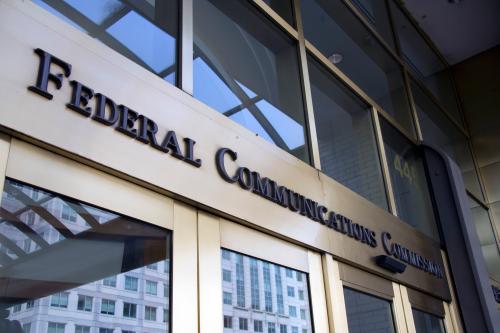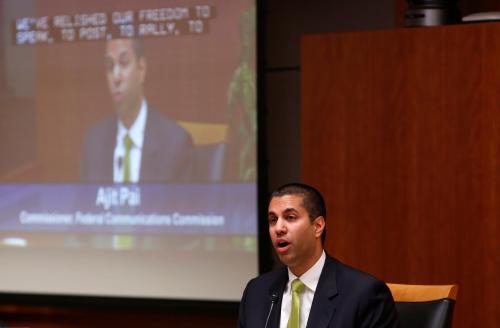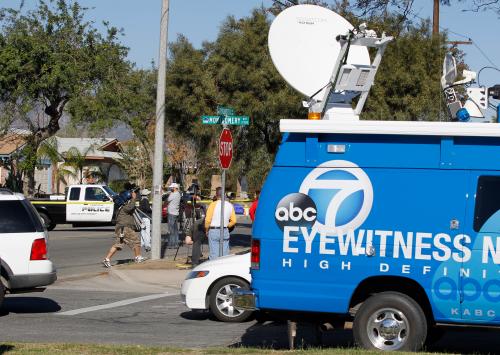Tom Wheeler served as the 31st Chairman of the FCC from 2013-2017.
Sinclair Broadcasting has a right to establish that that they did not engage in “misrepresentations and/or lack of candor”—an assertion by the Federal Communications Commission (FCC)—in matters related to its $3.9 billion acquisition of Tribune Media. The FCC has designated the matter for an administrative hearing before an administrative law judge. That hearing must go forward.
Tribune Media exercised its contractual right to end the transaction on August 8. Tribune also filed what could be a billion-dollar lawsuit against Sinclair, alleging willful breach of the sales agreement because of Sinclair’s handling of the merger with regulators.
In its unanimously approved Hearing Designation Order, the FCC ruled that a hearing before an administrative law judge was necessary to determine “whether Sinclair engaged in misrepresentation and/or lack of candor” in its dealings with the Commission. It was that Order that broke the back of the Tribune transaction.
Accusations about misrepresentations and a lack of candor matter in broadcasting law. Sinclair should have the opportunity to see the Commission’s evidence as well as present evidence in their own defense. A public hearing before an administrative law judge will assure that due process is afforded everyone.
Character counts in broadcasting
The character of the licensee is an important component in determining whether the party is a fit trustee for the public’s airwaves. Whether there were misrepresentations to the agency is an important indicator of fitness to hold a broadcast license—and Sinclair holds 173 such permits.
“At no point did Sinclair make any misrepresentations to or attempt to mislead the FCC in its applications,” the company’s legal counsel wrote to the General Counsel of The Brookings Institution, expressing unhappiness with my July 25th commentary in TechTank titled “How far will the FCC pursue Sinclair Broadcasting’s ‘misrepresentations’ now that Trump has intervened?” The company should have the right to support that position in an open, on-the-record proceeding.
The importance of the FCC following through on the administrative hearing was made even more important by President Trump’s tweet after the Commission’s action. “So sad and unfair that the FCC wouldn’t approve the Sinclair Broadcast merger with Tribune,” Donald Trump tweeted. The President then went on to call the decision “disgraceful.”
When the President of the United States describes the Commission’s decision in such pejorative and judgmental terms, the agency has a responsibility to uphold the honor and integrity of its processes and not to allow a shadow to hang over its proceedings.
Backroom deals would leave unanswered questions
The decision whether to continue with the hearing technically comes from the chief of the Commission’s Enforcement Bureau. But that position is appointed by and reports to the chairman of the FCC, so the decision on how to proceed ultimately sits on the chairman’s desk. The chairman has already said there are “[s]erious concerns about the Sinclair/Tribune transaction” and the representations the company made.
Here’s what to watch for, however: a backroom consent decree deal. The chairman could conduct a closed review through the Enforcement Bureau to avoid a protracted open hearing. The result may allow Sinclair to sign a consent decree in which they do not concede they made the alleged misrepresentations, but promise to pay a fine and sin no more.
Such a decision not to proceed with the open hearing would leave the Commission—and the public—with serious unanswered questions. How will the Commission treat Sinclair’s future transactions, its petitions to renew existing licenses when they expire, its future retransmission consent negotiations with cable operators that rely on good faith, or the new ATSC 3.0 television standard that it sponsors?
President Trump has hung a cloud over the FCC. The Commission has itself made assertions about the nation’s largest broadcaster that could affect its ability to hold licenses. The only way to deal with both of these realities is for an on-the-record presentation of the facts through an administrative hearing overseen by an administrative law judge.
The chairman of the FCC now faces a legacy-defining decision. After a victory lap for being tough on oversight, will he give a pardon to the friend of the president, or will he follow through with the open proceeding the law and procedural due process requires?
The Brookings Institution is committed to quality, independence, and impact.
We are supported by a diverse array of funders. In line with our values and policies, each Brookings publication represents the sole views of its author(s).








Commentary
To uphold its integrity, the Trump FCC must proceed with Sinclair hearing
August 14, 2018